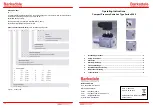
C
ABLE
L
ABELING
AND
C
ONNECTION
R
ECORDS
4-9
Cable Labeling and Connection Records
When planning a network installation, it is essential to label the opposing
ends of cables and to record where each cable is connected. Doing so will
enable you to easily locate inter-connected devices, isolate faults and
change your topology without need for unnecessary time consumption.
To best manage the physical implementations of your network, follow
these guidelines:
•
Clearly label the opposing ends of each cable.
•
Using your building’s floor plans, draw a map of the location of all
network-connected equipment. For each piece of equipment, identify
the devices to which it is connected.
•
Note the length of each cable and the maximum cable length
supported by the switch ports.
•
For ease of understanding, use a location-based key when assigning
prefixes to your cable labeling.
•
Use sequential numbers for cables that originate from the same
equipment.
•
Differentiate between racks by naming accordingly.
•
Label each separate piece of equipment.
•
Display a copy of your equipment map, including keys to all
abbreviations at each equipment rack.
Summary of Contents for 7824M/FSW
Page 2: ......
Page 18: ...TABLE OF CONTENTS xviii E Ordering Information E 1 Glossary Index ...
Page 40: ...NETWORK PLANNING 2 8 ...
Page 58: ...INSTALLING THE SWITCH 3 18 ...
Page 68: ...MAKING NETWORK CONNECTIONS 4 10 ...
Page 72: ...TROUBLESHOOTING A 4 ...
Page 80: ...CABLES B 8 ...
Page 86: ...EXTENDER MODULES C 6 ...
Page 96: ...ORDERING INFORMATION E 2 ...
Page 102: ...GLOSSARY Glossary 6 ...
Page 106: ...INDEX Index 4 ...
Page 107: ......
















































